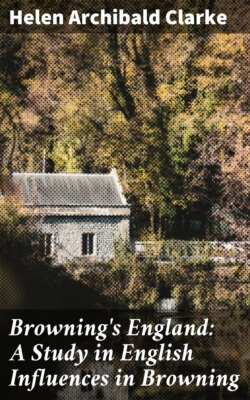Читать книгу Browning's England: A Study in English Influences in Browning - Helen Archibald Clarke - Страница 50
На сайте Литреса книга снята с продажи.
II
ОглавлениеWhat I love best in all the world
Is a castle, precipice-encurled,
In a gash of the wind-grieved Apennine.
Or look for me, old fellow of mine,
(If I get my head from out the mouth
O' the grave, and loose my spirit's bands,
And come again to the land of lands)—
In a sea-side house to the farther South,
Where the baked cicala dies of drouth,
And one sharp tree—'tis a cypress—stands,
By the many hundred years red-rusted,
Rough iron-spiked, ripe fruit-o'ercrusted,
My sentinel to guard the sands
To the water's edge. For, what expands
Before the house, but the great opaque
32 Blue breadth of sea without a break?
While, in the house, for ever crumbles
Some fragment of the frescoed walls,
From blisters where a scorpion sprawls.
A girl bare-footed brings, and tumbles
Down on the pavement, green-flesh melons,
And says there's news to-day—the king
Was shot at, touched in the liver-wing,
Goes with his Bourbon arm in a sling:
—She hopes they have not caught the felons.
Italy, my Italy!
Queen Mary's saying serves for me—
(When fortune's malice
Lost her—Calais)—
Open my heart and you will see
Graved inside of it, "Italy."
Such lovers old are I and she:
So it always was, so shall ever be!
Two or three English artists called forth appreciation in verse from Browning. There is the exquisite bit called "Deaf and Dumb," after a group of statuary by Woolner, of Constance and Arthur—the deaf and dumb children of Sir Thomas Fairbairn.
